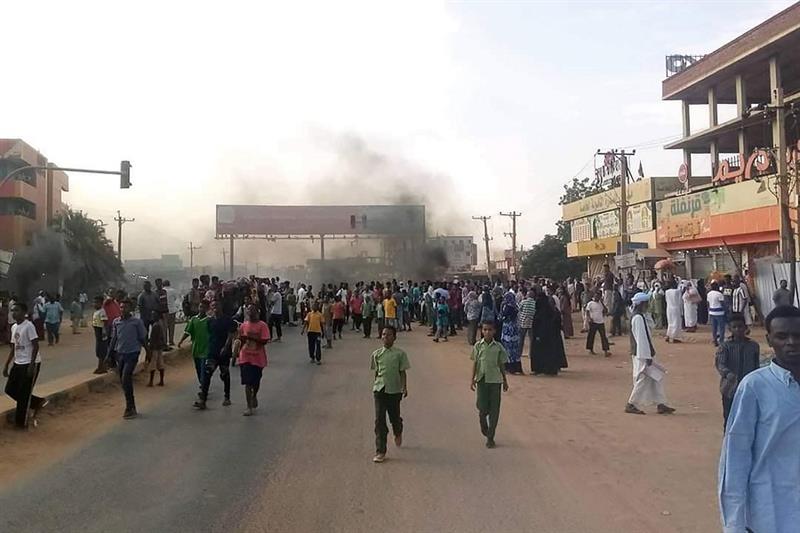
File Photo: In this Oct. 25, 2021, file photo, pro-democracy protesters take to the streets to condemn a takeover by military officials in Khartoum, Sudan.
The country fell into pariah status with the West under autocrat Omar al-Bashir, as Washington imposed crippling sanctions on his regime for sheltering Islamic extremists including Al-Qaeda leader Osama bin Laden in the 1990s.
Bashir was eventually toppled by his own military in April 2019 after street protests against his iron-fisted rule. A precarious civilian-military government shared power beginning later that year, only to be uprooted by Monday's coup.
On Wednesday the World Bank suspended aid to Sudan.
Its president, David Malpass, said he feared for the "dramatic impact" recent events could have on the country's social and economic recovery.
Just last month Malpass became the first chief of the development institution in nearly 40 years to visit Sudan, where he praised the country's reforms but cautioned against "political slippages."
In another blow on Wednesday, the African Union rejected the military takeover as an "unconstitutional" seizure of power, and suspended Sudan from the bloc.
It was only last December that Sudan formally freed itself of Washington's state sponsor of terrorism designation, opening the way this year to more than $50 billion in debt relief and renewed largesse from the International Monetary Fund and World Bank.
Sudan was on the right path, with "international assistance at last beginning to come in at the scale that was required," said Alex de Waal, a longtime expert on the country and executive director of the US-based World Peace Foundation.
US aid suspension
But by arresting on Monday the Prime Minister Abdalla Hamdok, a former international economist, along with several of his ministers and civilian members of the country's power-sharing council, the military has generated "serious risks for Sudan," a report from the International Crisis Group said.
Washington wasted no time in taking action. Hours after the coup it suspended a $700 million package of economic support meant to assist Sudan's democratic transition.
On Tuesday the European Union threatened to suspend financial support if Sudan's military does not immediately restore civilians to positions of power.
If such threats are carried out -- particularly by the Western donors and the World Bank -- Sudan's "progress, belated but nonetheless substantial, that has been made towards stabilising the economy, will unravel", de Waal said.
Sudan is one of the world's least developed countries, where a tripling of bread prices in late 2018 triggered protests that led to Bashir's removal by his own military.
The country has lately faced shortages of medicines and other essentials, and inflation is well above 300 percent.
Following Bashir's ouster the Gulf monarchies deposited an initial $500 million at the central bank as part of a promised $3 billion assistance package to maintain their influence in the country.
A troubled region
Even if military chief and coup leader General Abdel Fattah al-Burhan gets further Arab financial backing it will not match that offered by international institutions and Western donors, de Waal said.
The coup "leaves Sudan potentially extremely isolated, going back into a period of being shunned by the rest of the world," he added.
Shunned, but in the company of other troubled countries in the region.
Sudan's neighbour to the southeast, Ethiopia, has been engaged in a year-long war against the Tigray People's Liberation Front, while South Sudan remains embroiled in years of conflict.
On Sudan's western flank, Chad remains in the grip of the military, albeit one threatened by insurgents, and further west there is unrest in the Sahel.
"A protracted struggle in Sudan would be a further disaster for the region," the ICG report said.
On Monday the Information Ministry, which is loyal to Hamdok, said soldiers "fired live bullets on protesters... outside the army headquarters" following the coup. At least four demonstrators were killed and about 80 people wounded, according to the independent Central Committee of Sudan Doctors.
Analysts have expressed concern that resistance to the coup could be brutally repressed.
De Waal said this would not only mean bloodshed in the capital Khartoum. "The civil war in the provinces in Darfur and South Kordofan would most likely be reignited," he said.
*This article had been edited by Ahram Online
Short link: